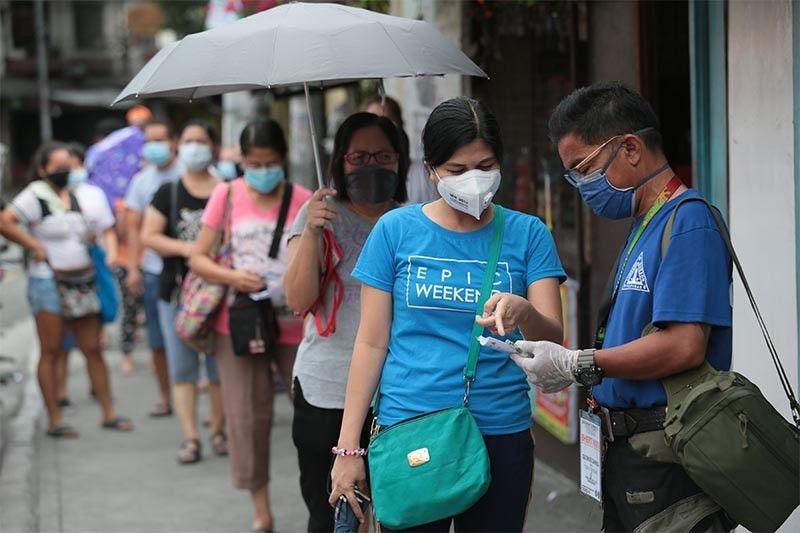Philippines struggles to juggle health, economy in COVID-19 fight

MANILA, Philippines — Over a month since the economy reopened, the Philippines is struggling to keep the virus spread in check while leaving most of the economy functioning, a growing problem that demands a long-term fix or risks putting more lives in danger.
The challenge is glaring. While since March the Duterte administration sacrificed economic prosperity by locking down most of the archipelago to save lives, Carlito Galvez Jr., chief implementer of the National Task Force Against COVID-19, said the same tack is not feasible in the long run without pushing down more Filipinos to poverty.
“We are having a rebalancing of the economy and health and we saw that as per (Finance) Secretary (Carlos) Dominguez, the economy is now on the tipping point, meaning the situation is very difficult,” Galvez said in a briefing on Monday.
But the ongoing rebalancing is appearing too difficult to handle. On the ground, COVID-19 cases that have once subsided during lockdowns have started to reach new highs over the past week. Hospitals are again declaring full capacity, reminiscent of pre-lockdown times in March, all while companies, even large ones, are laying off workers even after they have restarted operations.
The two-pronged problem left the Duterte administration calling on the private sector to a whole-of-nation approach against the pandemic. Galvez reiterated this on Monday, saying “the responsibility shifts” to the local government units, private companies and individual citizens as far as “effectively” managing COVID-19 is concerned.
Businesses agreed. “The world will have to live with the virus until a vaccine is available and most people infected will recover,” John Forbes, senior adviser at American Chamber of Commerce in the Philippines, said.
“A dead economy could be the worst outcome for all,” he said.
Cases rising
But in the past month that localized lockdowns were enforced by LGUs, cases did not temper. On Monday, a delayed case report from the health department for Sunday showed 2,124 new COVID-19 cases. In the afternoon, additional 836 cases were reported. Deaths have also increased to 1,599 even as recoveries reached 20,371.
The persistent rise in COVID-19 cases even as lockdowns were eased is becoming a source of concern for experts and even netizens who earlier questioned a government decision to relax Metro Manila’s lockdown last June 1 despite rising cases.
“Because of the ongoing transmission, I personally feel that it is going to be a difficult balancing act of easing current quarantine restrictions without a stronger plan on how to address the challenges of increasing cases and deaths,” said Dr. Benjamin Co, an infectious disease expert, on his blog.
Economy in jeopardy
As if getting the pandemic under control is not enough, the Philippines is also finding itself struggling for quick economic recovery. Already, the central bank has projected negative growth for the rest of the year, cementing the government’s expectations of a 2-3.4% contraction by year-end.
But beyond the data, the economic impact of lockdowns and the pandemic is already being felt. Over the past one month and a half, large companies such as Aboitiz Equity Ventures and Ayala-led Bank of the Philippine Islands have announced impending layoffs.
The situation is worse in sectors directly hit by the pandemic like the aviation industry. In Cebu Air Inc., 25% of the workforce would have been let go by the end of August after the completion of the next round of layoffs.
“Right now the stinginess of the economic managers is the biggest binding constraint to addressing the pandemic, alleviating economic distress of poor households, and economic recovery,” Sonny Africa, executive director of think tank IBON Foundation Inc., said.
“Every day of delay means another day of people suffering lost incomes and of firms closing down,” Africa added.
If one would consider the fact that over 98% of local firms are small and –medium enterprises, the number of closures, including comedy bars, food businesses and even small restaurants, all announced in social media, would be more glaring.
A solution eyed is a government-initiated stimulus measure similar with other countries. But to date, legislators and economic managers remain at loggerheads over stimulus costs, one which the Duterte administration wants capped to ensure its debt remain manageable. Senate President Tito Sotto said there is “no notice yet” from Malacanang for a special session, less than two weeks before Congress reconvenes on July 26.
Calixto Chikiamco, president of Foundation for Economic Freedom, a group of former finance secretaries, said the government should “go big and go fast” in stimulus.
“No doubt the delay in the passage of the economic stimulus bill will accelerate the doom spiral, resulting in an even more severe contraction of the economy,” he added.
- Latest
- Trending




























